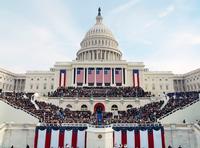The peaceful transfer of power from one presidential administration to the next is a hallmark of our democracy—and something that Americans take great pride in. The occasion is particularly bittersweet when one of our two major political parties must yield to the other. By all accounts, the transfer of power from Republican George W. Bush to Democrat Barack Obama was nearly flawless, with civility, courtesy, and excellent cooperation throughout the entire process. The transition between President Obama and President-Elect Donald Trump has been marked by some tense moments. That too is part of the normal pattern...
As one might expect, the arrival of a new president following a bitterly contested election has never been short of drama and memorable moments. Democrat James Buchanan and Republican Abraham Lincoln were certainly civil and correct during the moments that they spent together. When the time came for Buchanan to take leave of Lincoln forever, the Pennsylvania Democrat said: "My dear sir, if you are as happy on entering this house, as I am on leaving it, then you are the happiest man in the country."
Relations between Herbert Hoover and Franklin D. Roosevelt could hardly have been worse. Hoover was bitter about his defeat in the Election of 1932. For his part, FDR resented the fact that following the election, Hoover kept trying to force the President-Elect to sign on to policy proposals and plans that he opposed. When the Roosevelts arrived at the White House to pick up the Hoover’s for the ride to the swearing in, it turned out that President Hoover had a final surprise in store for his successor. Outgoing Secretary of the Treasury Andrew W. Mellon was on hand to give FDR a lecture on sound fiscal policy. While he was careful to hold his tongue, Roosevelt was furious. Worse was to follow. When the two men rode together after leaving the White House, FDR did his best to lessen the unpleasantness of the event, by making conversation. No matter what the President-Elect said, Hoover stared straight ahead, ignoring his successor. It must have been a very long ride.
A variation of this sad spectacle occurred again twenty years later, when President-Elect Dwight Eisenhower, a Republican, was preparing to replace FDR’s former Vice President, Democrat Harry Truman. The two men, who hailed from neighboring states in the Midwest, had been friendly during World War II. However, politics eventually drove them apart. During the 1952 campaign, Senator Joseph McCarthy (R-Wisconsin) attacked Eisenhower’s former boss, U.S. Army Chief of Staff, General George C. Marshall, as someone who was aiding the cause of international Communism. Marshall was one of the most important heroes of World War II—and his conduct throughout his career had been spotless. Eisenhower had planned to deliver a tribute to Marshall during a campaign stop in Wisconsin, but McCarthy pressured candidate Eisenhower into dropping this section from his remarks. Truman was convinced that Eisenhower was a coward and wasn’t shy about saying so.
When the Eisenhowers arrived to pick up the Trumans on Inauguration Day in 1953, President Truman invited Dwight and Mamie Eisenhower inside for coffee. The President-Elect refused to leave his automobile. The ride to the official ceremony brought a different kind of conflict between the two enemies. Eisenhower demanded to know who in the Truman White House had sought to embarrass him by ordering his son John, who was then serving in Korea, home for the inauguration? Truman quickly replied that he had done it, because he thought that John deserved the chance of seeing his father sworn in as the next president.
Drama comes in many varieties during a presidential inauguration. In 1923, President Warren Harding, an Ohio Republican, died unexpectedly. His Vice President, Calvin Coolidge was then vacationing at an old family cabin in Vermont. The cabin lacked a few luxuries like a telephone, electricity, or running water. Finally, a messenger arrived bearing the news that Harding was dead. This was followed by a second courier, bearing the command that Coolidge must be sworn into office immediately. The Coolidge family hastened to follow the order that they had been given. It was after 2:00 a.m. when John Coolidge, the new President’s father, administered the oath to his son. The senior Coolidge depended on an old kerosene lamp to discharge his responsibilities. Coolidge was the only President in the nation’s history to be sworn in by a notary public.
When it comes to high drama, it may be impossible to top the actions of Andrew Jackson, who was sworn into the presidency following the 1828 election. Everything was fine until the part of the afternoon devoted to the Presidential open house, which was open to all interested persons in those days. Jackson, who had campaigned for the office as a Westerner and a friend of the common man, drew such huge crowds to the White House, that his guests became a huge unruly mob, who quickly broke some of the White House china, tore up the carpets—and according to some historians—ground cheese into the surviving carpets with their boots. Eventually, as the crowd continued to grow, Jackson, a courageous battle-tested general, no longer felt safe. Depending on which historian one reads, he finally escaped through a back door—or a window.
Have a question for Free Library staff? Please submit it to our Ask a Librarian page and receive a response within two business days.

